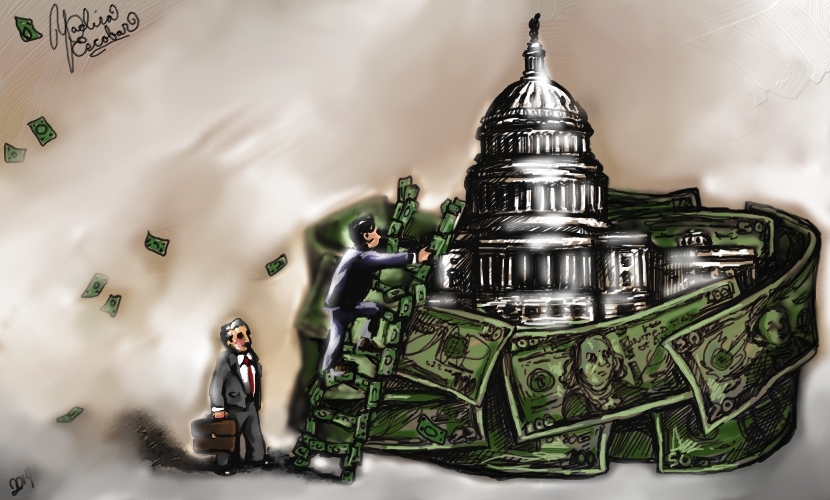
The impecunious politician: A vanishing breed
An urban legend with a splash of Hollywood glitter would have us believe that anyone with enough ambition, discipline and effort can rise to Congress or the White House. The truth is that, if we set aside the three or four special cases of Democrats who have reached media stardom, we are left with a pile of old-fashioned politicians.
Maybe they tell some gilded story about their ordinary origins. They say that their grandmother was a nurse or their father was a barman trying to give their son or daughter a good future, but generally politicking involves money and — all too often — legitimizes dark interests.
It is estimated that George Washington, the great founding father, owned $525 million, 300 slaves and thousands of acres of fertile land in Virginia. Those figures contrast with Obama’s worth, estimated at $10 million, earned in part by the royalties from his three books. But the question that arises is this: Is it possible to reach Congress to become the people’s representative without money?
The most frequent trend is continuity, as we see in the case of the Kennedys, where several relatives, from different generations, are elected to political jobs. After the traditional step of attending some Ivy League school, the conservative step is to carve a niche in politics.
Using the fame of the Bush family as a guideline, we can see something about the Republican voter. Many Americans are not ashamed of venerating that clan; they not only put George H. W. Bush’s son in the White House but also are toying with the idea of a third President Bush — the former governor of Florida, Jeb Bush.
If the public worships a family tree, it is entitled to do so. Democracy does not discriminate against a surname, because even some phobias are inherited, so, naturally, some genes have their preferences and maybe spontaneous talent. But the brand most often seen, and the brand some prefer to hide, is the bank account of these ruling dynasties on the edges of political power. The Kennedys were and are multimillionaires; the Bushes even more so.
In the state of Florida, the candidates of any major party must pay $10,440 to register, because it seems that typists charge a lot to input their data to the system. It’s amazing how some states don’t demand a minimum of signatures from a candidate whose supporters may number less than 10, but they collect his 10 thousand just the same.
In most cases, it is the party that assumes the cost, which partly explains why the candidates don’t run as individuals but as appendages of the two wealthiest parties.
According to studies done by Vital Statistics on Congress, (http://www.brookings.edu/research/reports/2013/07/vital-statistics-congress-mann-ornstein) the victorious senators typically spend $10.3 million in their campaigns. Just to assure yourself a seat in the House of Representatives will cost you more than $1.6 million.
That seat is expensive, even when priced by the standards of the high-middle class. Think about this: How many concessions will that politician make, despite his good intentions for his district?
For example, according to a specialist from TIME magazine, if we add up all the expenses of Hillary Clinton’s very likely presidential campaign, they’ll total $1.7 billion. The estimate is done on the basis that each winner of the presidency ends up spending about 150 percent more than the previous incumbent.
Let’s not forget that in the last election, Mitt Romney (estimated worth: $250 million) had to spend part of his personal fortune in the race for the White House. He is not the only one, because the practice of self-financing is totally legal. For example, Florida Governor Rick Scott invested more than $70 millions of his own money to ensure his victory in 2010. This year, he may have to dig into his wallet for more.
In fact, in 1976, the U.S. Supreme Court ruled that it would be a violation of the First Amendment to limit the money spent by a candidate in his own campaign. That is how Ross Perot, an independent candidate, contributed $63 million out of his own pocket to his campaign. In Hillary Clinton’s case in 2008, the amount was $11 million.
However, in view of the speed with which election costs rise, we can deduce that in a nearby future it will be very difficult for even a wealthy American to reach any post of real power in the United States — and definitely impossible for an average American.
Even a candidate for mayor of a town, motivated by the honest desire to improve his community, has to make deals with his supporters, who expect something in return, of course.
How many times does that politician give in and makes a deal under pressure from some corporation that promises to fund his campaign under certain conditions?
How many deals take place behind closed doors as a consequence of the astronomical price of the surrealistic campaigns of our era?
If the cost of political careers continues to rise, very soon only those shrewd politicians who make alliances with the ultrapowerful — such as some oil baron, for instance — will be able to represent their communities.
Unless the current structures and regulations are reformed, and if the chasm between the rich and the poor remains, the system of representation will turn into a hollow shell and the word “republic” will lose its meaning.
It is evident that the ruling classes prefer to block the road to any political post. They’re more comfortable when one of their own is accepted to the guild.

